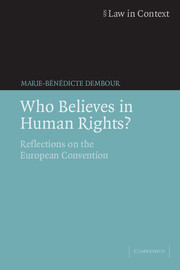Book contents
- Frontmatter
- Contents
- Acknowledgements
- Table of cases
- List of tables
- 1 Introduction
- 2 The Convention in outline
- 3 The Convention in a realist light
- 4 The Convention in a utilitarian light
- 5 The Convention in a Marxist light
- 6 The Convention in a particularist light
- 7 The Convention in a feminist light
- 8 The human rights creed in four schools
- 9 Conclusion: In praise of human rights nihilism
- Appendices
- Select Bibliography
- Index
5 - The Convention in a Marxist light
Published online by Cambridge University Press: 03 February 2010
- Frontmatter
- Contents
- Acknowledgements
- Table of cases
- List of tables
- 1 Introduction
- 2 The Convention in outline
- 3 The Convention in a realist light
- 4 The Convention in a utilitarian light
- 5 The Convention in a Marxist light
- 6 The Convention in a particularist light
- 7 The Convention in a feminist light
- 8 The human rights creed in four schools
- 9 Conclusion: In praise of human rights nihilism
- Appendices
- Select Bibliography
- Index
Summary
[T]he so-called rights of man, the rights of man distinct from the rights of the citizen are nothing but the rights of the member of civil society, i.e. egoistic man, man separated from other men and the community.
(Marx)There is something presumptuous in writing a chapter which purports to read the European Convention in a Marxist light when one is versed, like me, neither in Marx's voluminous work nor in the many commentaries and theories it has generated. Still, this chapter could not have been omitted: first, because ‘the young’ Marx touched directly upon the ‘rights of man’ in an essay which has become very famous and, second, because the main idea of this text remains extremely pertinent today.
As the statement at the head of the chapter makes clear, Marx felt that the rights of man comforted man (he did not think much about women) in his egoism; as such the rights of man were not destined to have a place in the truly communal society which he did not doubt would one day emerge. Though Marx was not a fan of what we now call human rights, there is nonetheless a sense in which he was less scathing of them than Bentham: for Marx, human rights were not nonsense but a step in the right direction in the long march of humanity's history.
The human rights credo would have us believe that human rights are for every human being. Marxism alerts us that this is not so.
- Type
- Chapter
- Information
- Who Believes in Human Rights?Reflections on the European Convention, pp. 114 - 154Publisher: Cambridge University PressPrint publication year: 2006



